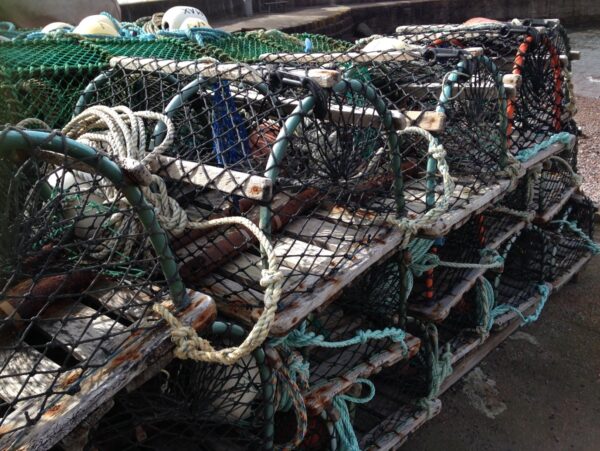From 12th May 2024, selected interim measures will be implemented in Scotland for inshore fishing vessels, including:
- prohibition on landing of egg-bearing crab and lobster into Scotland
- controls on creel fishing vessels of more than 12 meters overall with a track record of landing more than 200 tonnes of crab and / or lobster in any 12 month period since 2020
- updating Scotland’s stock assessment data in 2024, considering other indicators of stock health for crab and lobster, as well as improving the crab and lobster sampling programme
- consulting on a broad package of inshore fisheries management measures later in 2024
- progressing related key transformational projects such as inshore vessel tracking for the under 12 metre fleet
Inshore fishing vessels make up 80% of Scotland’s ~2,000 registered vessels and operate out to 12 nautical miles. Typically, the vessels are a mix of creelers, Nephrops trawlers, hand-liners, scallop dredgers and divers.
Credit: Marine Directorate Image Bank, photo by Ruth Allen
Co-Management
Cabinet Secretary for Rural Affairs, Land Reform and Islands, Mairi Gougeon, said:
“It’s in all of our interest to alleviate pressure on our shellfish stocks and improve the science base to help ensure sustainability for Scotland’s most prominent inshore fisheries.
“Decisive action and co-management will help aid Scotland’s transition to a more agile and responsive management system.
“Only by engaging with all of industry, and listening carefully to people’s unique ideas and expertise, will we create solutions and policies that work for businesses, the wider sector and, importantly, the marine environment.”
Recent research from the Scottish Marine Directorate found crab and lobster stocks are under pressure from overfishing in many areas.
Earlier this year, working with the Regional Inshore Fisheries Groups (RIFGs) and Fisheries Management and Conservation (FMAC) Inshore Fisheries Subgroup, the Marine Directorate began engaging with hundreds of fishermen and representatives to address these challenges of declining catch rates for crab and lobster head-on and formalise solutions. Central to this approach is collaborating with industry on how short-term interim measures might improve the health of shellfish stocks and overall sustainability of our inshore fishing industry from May 2024.
The Scottish Marine Directorate states “We want to continue the co-management approach demonstrated by our development of interim measures. This includes government, industry, academia and others coming together to help shape fisheries management policy that recognises the complex variations and interlinkages in Scotland’s inshore fisheries.”
Clarification requested
However, concerns have been raised from the Rural Affairs and Islands Committee regarding the new measures. The Committee are seeking for clarification on:
- the powers under which these interim measures will be introduced;
- how the interim measures will be enforced;
- the available penalties for failure to comply with the interim measures;
- how long the interim measures will be in place for.
Along with other points regarding stakeholder engagement, license condition and impact assessments and effectiveness of the monitoring.
Fishery in Galloway concerns
In addition, it has been reported that the new changes will “devastate the Galloway fishery”.
The Galloway Static Gear Fishermen’s Association has been lobbying the Scottish Government that the measure is not needed in the Solway. Chairman Frazer Scott told the News: “If this ban is implemented there will be no commercial fishermen left in the Solway – we will be bankrupted.
West coast fishermen have brown crabs and langoustine as a by-catch – but we don’t have that. Lobsters are our only source of income and we are not even allowed to catch white fish such as sea bass. There is zero scientific evidence to support it in the Solway and minimal, outdated data for the rest of Scotland.”
